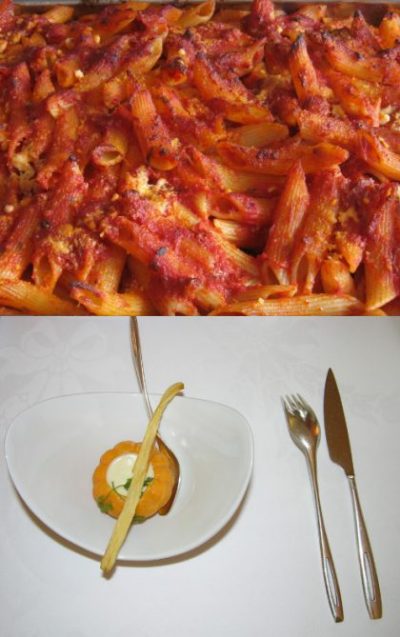
Carlo Cracco, MasterChef, a difficult guy. Photo: br1
Carlo Cracco is a famous Italian Top Chef, better known for his TV appearences as a judge in MasterChef Italy.
A controversy erupted in the social media in occasion of a New Year’s Eve prestigious dinner in Venice: 60 fortunate revelers had the privilege to pay 1500 Euros to get to an exclusive party dinner with performers, gondolas, fireworks etc.
Cracco’s name was used to promote the event, but apparently he didn’t even go there: he only instructed chefs to serve one of his signature dishes.
Critics hiding behind a keyboard were fuming.
Here’s the bottom line. Proceeds: 90 thousand Euros, of which 10 thousands were given to Cracco to sign the dinner and give prestige to the event.
He’s not new to being subject to public controversies. Beyond participating in a famous TV show, he banked on his fame as a great chef to become a testimonial for cheap industrial chips.
He seems to enjoy the role of the unpleasant guy everyone has strong opinions about. As per the famous Oscar Wilde quote:
“There is only one thing in life worse than being talked about, and that is not being talked about.”
In the past he was even attacked for daring to cook a pigeon during a MasterChef episode…
But this is beyond ludicrous… Pigeons are actually a staple of traditional Italian cuisine in some towns (Orvieto, for instance; I ate it myself). There’s no reason to single out this animal as deserving a special treatment. And it doesn’t make sense to narrowly focus on a single chef, as if this dish was some odd and cruel concoction he just came up with.
Let’s see… what’s all the fuss about?
Here’s a collection of the talking points used:
- They’ve been had. Cracco didn’t even go. What did he sell them? Who does he think he is? –HE FOOLED THEM
- A dinner couldn’t possibly cost that much. It’s not worth it. –I PITY THEM
- Spending 1500€ for a dinner is an affront to poverty. You can’t waste money like that. –THAT’S DISGUSTING!
- There’s an unacceptable gap between us and those happy few that can afford to spend crazy amounts of money. –I ENVY THEM
Deal with it: you simply don’t get haute cuisine.
1- Cracco let them down by not going? Wait, were you among the partygoers? No! So? If they were OK with that kind of arrangement, what makes you think you can pass a judgment?
Being a chef isn’t as scalable as many other professions, where competent people can rise to the top making tons of money. Writing books, composing music, performing live (including popular sports)… you can reach a vast audience in many ways. The cream of the crop can earn hundreds of millions, possibly even working a lot less than when they were still unknown, struggling to emerge. Similarly, a top manager can rise to great heights, running companies that rival with sovereign states in terms of size. A cook instead, even if exceptionally talented, could only satisfy the clients of his restaurant; and it never ceases to be a demanding job.
That’s why cooking artists who want to become stars and get positive feedback try to come up with alternative ways to monetize, expand their brand, obtain success and public recognition: cooking classes, books, TV gigs, product testimonials… As for their field work, delegating more and more is a natural choice, since the very basis of this job consists in knowing how to lead a team, guaranteeing that your sous-chefs know how to respect your original style, keep the quality standards and channel your inspiration.
Any decent restaurant will serve you well presented dishes, made with quality ingredients, tasting great and hopefully evoking new emotions. That’s a result you have to thank the chef for; and yet, some of the courses were probably made by a young, inexperienced cook.
A great chef is great precisely because you can’t tell if a dish was made by him personally or by one of his assistants!
That’s why there’s nothing wrong with just putting your “signature”, without even showing up, if you are able to ensure an outstanding quality standard.
If a popular chef is too busy with his self-promotion tours, TV appearances and events, to the point that he’s losing grasp of how his restaurant is run, the quality will suffer: his reputation will consequently be tainted. The system works: let people decide with their taste buds.

Which one makes your mouth water? Photos: pasta al forno, Blues 1911; Nouvelle Cuisine, Jérôme Decq
It’s moronic to pretend to judge a dish based on a photo, without ever having had a taste. There’s a whole genre of internet culinary controversies that is really about people pretending to give a definitive value to their lack of imagination. Crass ignorance FTW.
Don’t get me wrong. It’s entirely plausible to assert that some traditional dishes, prepared according to consolidated yet simple principles, may be way more satisfying than the latest nouvelle cuisine creation. Think about some ravioli al sugo, gnocchi with pesto, pasta al forno (but since these examples prove how I’m too fixated on Italian pasta courses, let’s put a juicy BBQ steak in the mix). It’s stuff you’d never think of “presenting” in a certain way to obtain the diners’ approval.
Compare and contrast with stuff like “cauliflower in almond milk sauce, served with yuzu juice and seafood”, or “elderberry broth with aubergine buttons and Roman mint swirls”. I’m thinking of certain plates that look like a painting; with a small lake, pebbles and moss creating a landscape, to the point you can’t tell the edible part from the rest.
All hail genuine stuff, simple traditional recipes, solid food that any hungry Neanderthal craves! Ok, stipulated.
But there are good reasons to humbly admit that great chefs bring something more to the table: ideas that are fresh, different, sometimes a little too provocative, in any case creating a new experience.
If you’re unable to get that, that’s just your problem. You don’t enjoy such delicacies? Fine, be my guest! Avoid them. But you can’t pretend to be the one who’s taking the high road.
Sure, high cuisine is expensive. But if you look carefully and avoid the “stars” (Michelin Guide or otherwise), you can find capable modern, creative chefs offering a lot for a reasonable price.
Of course household names call for a significant markup; no surprise here. You are free to go eat somewhere else without unnecessarily pontificating.
Forget about waste. Focus on envy, instead.
2- OK, let’s concede that a dinner cannot possibly be worth all that money.
“I’m sure I was way better off eating at Grandma’s!”
Fine. Whatever!
Don’t get me wrong. 1500 Euros is a shocking price for my standards. I’m just a plebeian: a commoner who gets uneasy around glitzy stuff and pomp.
But before you arm yourselves with pitchforks and surround some ritzy mansions chanting slogans, please try to understand the concept of luxury.
Take the two popular fashion stylists Dolce&Gabbana. They’ve been recently troll-attacked because they dared to dress Melania Trump! The horror!
Anyway, they’re getting used to being at the center of media storms these days. A couple of years ago they were attacked for the arguable lack of proportion between the store prices of their creations and the actual factory costs. Stefano Gabbana replied, curtly:
Do you understand what luxury means…?
It’s a rule of life: the more you invest in something, the lesser the return for any additional investment.
A 10K$ car is worth a lot more than a very old 1K$ car that could give its last breath any moment.
But what about a 20K$ one? Surely you can expect to get a more powerful engine, better safety features, more accessories and internal space… Definitely better than the 10K$ one, but not “twice as better”; if all you care about is going from point A to point B, they are equivalent.
Now, what happens when you buy instead a 100 thousand dollars car? You can count on a lot of HPs, it’ll be sporty and/or luxurious; but it’ll also probably lack trunk space and practicality (you don’t use a Porsche to buy groceries)…
The more you pay, the more you get into luxury territory: obtaining less significant or questionable improvements. This includes things like putting your hands on a rare object, the perception of an exclusive pleasure, something to show off, more people expressly working for you, some vague idea of quality…
3- There’s nothing strange in finding out there are prices out there that appear prohibitive or incomprehensible to us.
The Universe isn’t fair. There’ll always be the case of a homeless guy who’s attached to a trinket he found on the street and knows every single detail of it, valuing such object more than a billionaire will ever get to know entire wings of his mansion, a giant villa he’ll never properly enjoy.
It’s not your duty to correct the course of events. Even if railing against income inequality is quite popular these days.
Christian morality is something different. It’s not about demonizing money. Rich people are not condemned to the flames of Hell just because they are rich. Let the rich man face a merrily pedantic monk lecturing him to try and awaken his conscience. Don’t even think of substituting the pedantic monk with the brilliant overarching plan devised by a legislator to equalize everything. It doesn’t work.
The Eurosocialist mindset, Progressive Decadence: withering in the name of narrow-mindedness.
If there’s people spending money and maybe wasting some of it, there must be people happily serving those customers and making a decent living out of it. You don’t resist commerce and production, you embrace it.
This is a quite simple idea, really. Most Americans get it. Most Europeans don’t, especially Italians (I know this from experience). I wonder how many young Americans have been brainwashed into thinking that the socialists got it right and they should turn the US to the Light of Progress. US colleges nowadays sound very European…
Every action carries consequences: if you shoo rich tourists away, you’ll get poorer and poorer. They’ll still waste their money, only somewhere else.
It’s a pity to watch a proud tradition of Italian excellence in many fields (not just fashion or food) being wasted away, piece by piece.
Recently Flavio Briatore (the ex Formula 1 manager) was, him too, attacked by the usual cohort of Facebook censors because he is building an exclusive luxury resort in Apulia, and he was lamenting the lack of interest in the development of this top level tourism sector in Italy.
People seemed convinced that is not the kind of tourists Italy needs: apparently we want more culture and art, less luxury and nightlife. Go figure! This is not unlike the knee-jerk reaction to the Cracco exclusive dinner.
How disgusting! All those glistening yachts! Of course (we suspect) the owners must be tax cheats!
Saying no to excessive luxury: fewer tourists, less spending, dwindling investments, more “sobriety”. They call it degrowth.
It becomes cultural: we change our attitude to life, we get mad at our neighbor for any of his alleged shortcomings, in a mad rush to the bottom. The only shared pleasure to indulge in is the idea of criticizing the show-offs, those who waste, anyone acting in a disapproved way. Any new initiative should win over the strong opposition that is being artificially staged for the benefit of professional grousers. Sort of real-life trolls.
At times I think Italians seem to be aptly represented by just two special categories: bureaucrats and elder citizens who watch roadworks to kill time.
I guess it’s not just Italians… Do you see any Californians mad at their politicians for the gradual increase of legislative burden, red tape and special local permits needed to open a shop? Exactly.
In Italy today rich people choose understatement just to be on the safe side, to avoid being singled out as a dirty capitalist, by the fiscal authorities and by people in general.
Possessing an apartment other than the one you are living in, even if it’s the old house of your grandparents up on the mountains and no one wants to live there, is punished through taxation as a luxury.
Envy as a way of life. A system. Everybody is pushed to become just like everybody else…
What lies behind all this rich-shaming: a Lowlife version of Marxism.
There’s a problem with people who cry foul when hearing about a dinner costing hundreds of €/$, or with those who seem unable to appreciate sophisticated, extravagant dishes. It’s a toxic mental attitude. Shared, among others, by gullible types who love to rant against tax cheats, dream of landing a permanent job position in a public office, live their lives -and vote- passively. Shared by activists who commemorate Fidel Castro and insult those who disagree (I’ve been called a “beast” for badmouthing the dictator). By those who made “entrepreneur” and “business” into bad words. Their ideal of University is a place where philosophy and gender studies majors dictate the agenda, and science is an afterthought (in Italy, in the last few decades, intellectuals successfully stifled any attempt to connect universities, engineering departments and technology companies, because in their view culture should be kept separated from any vulgar matters like money and private enterprise… The technological decline of a nation ensued…).
4- Picking a fight with rich people for their simply being rich is moronic. Income inequality will always be a thing. Even in some hypothetical future where swarms of robots and abundant resources would give people anything they may want in the blink of an eye, without even the need of working, you’d still find some successful individuals obtaining something more: a personal cook still preparing dishes with his very own hands, the opportunity to collect antiques, vacationing on a secluded tropical island…
Fighting to diminish the inequality, by impoverishing the most affluent segment of a society, is ill-advised and counterproductive. Poor people stay put in their misery, but in the process everybody gets to hate the guts of the opposite group.
We need to learn to accept that others are different. Even rich-different, wasting money in ways we can’t comprehend. The world is big and full of variety; it’s also not under your control. Reality doesn’t value your opinion.
In order to contrast its rapid decay, our civilization would need, among other things, a more open and relaxed approach to news, preventing indignation from becoming automagically viral. You can’t pretend to embody goodness by attacking outliers. Or at least, if you do, remember a couple of things.
I- You are the envy of old wives, Quakers and Puritans. Christian morality, so easily dismissed as antiquated, at least makes sense. This new self-righteousness doesn’t.
II- Robespierre the Incorruptible, after countless poor souls he condemned, eventually died by the guillotine himself.










































